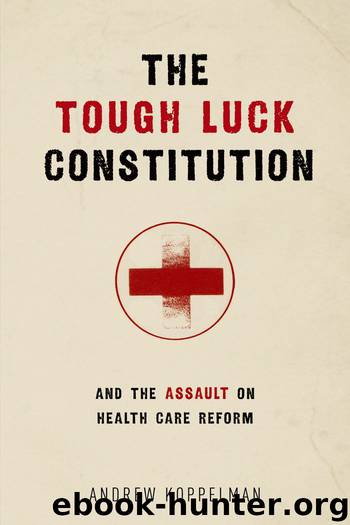The Tough Luck Constitution and the Assault on Health Care Reform by Andrew Koppelman

Author:Andrew Koppelman
Language: eng
Format: mobi, epub
Publisher: Oxford University Press
Published: 2013-02-21T22:00:00+00:00
THE PATH TO THE SUPREME COURT
Lawsuits were filed against the law hours after it was signed, March 23, 2010. They got a remarkably sympathetic hearing from two federal district judges, Henry Hudson and Roger Vinson. In each case, courts had been chosen where congenial judges sat: Florida attorney general Bill McCollum bypassed the courthouse a few blocks from his Tallahassee office and filed in Pensacola, a district court with only three judges, all conservative Republican appointees. (Vinson was one of these.) In August, Hudson denied a motion to dismiss, and in October, so did Vinson. “Never before has the Commerce Clause and associated Necessary and Proper Clause been extended this far,” Hudson wrote. It was fortunate for the challengers that Hudson was the first judge to hear the case: for years he had held stock in a Republican consulting firm whose clients had included Ken Cuccinelli, the Virginia attorney general who was plaintiff in the ACA case. In December, Hudson ruled that the mandate was unconstitutional. Vinson reached the same judgment in January 2011, but he then struck down the entire statute. His invalidation of the mandate, but not of the rest of the law, was upheld by the Eleventh Circuit Court of Appeals in August. Hudson’s decision was vacated when the Fourth Circuit held that the suit was barred by the Anti-Injunction Act, which bars suits to avoid the payment of taxes.35 Three other district judges—in Michigan, the Western District of Virginia, and the District of Columbia—summarily threw out the challenges.36 The Sixth and D.C. Circuits both held that the mandate was constitutional. Notably, two Republican-appointed court of appeals judges of unimpeachable conservative credentials, Lawrence Silberman and Jeffrey Sutton, both could find no constitutional objection to the mandate.
A few states cited federalism concerns to justify laws that sought to nullify the ACA, declaring that their citizens did not need to comply with the mandate. These are obviously void under the clause proclaiming the Constitution and federal law the “supreme Law of the Land,” and they received little attention. The more serious challenge, and the one that we shall now focus on, is that the mandate is unconstitutional.
Hudson and Vinson wrote the most important lower court opinions, because they gave plausibility to what until that point had been dismissed as frivolous arguments. The constitutional objections to the bill had already been given credibility by their frequent repetition during the December 2009 debates. Now they had the imprimatur of two federal judges, in widely publicized decisions. (The courts that upheld it—and there were more of them—got less prominent news coverage.)37 Because these decisions transformed the debate, lending the objections judicial approval, it is worth examining their reasoning in some detail.
Hudson and Vinson had to contend with both the commerce power and the Necessary and Proper Clause, which, we have seen, provided ample federal authority for the mandate. How did they address these difficulties?
Begin with the commerce power. Both judges declared that the action/inaction distinction was a limit upon its exercise. Hudson
Download
The Tough Luck Constitution and the Assault on Health Care Reform by Andrew Koppelman.epub
This site does not store any files on its server. We only index and link to content provided by other sites. Please contact the content providers to delete copyright contents if any and email us, we'll remove relevant links or contents immediately.
Day by Elie Wiesel(2781)
The Age of Genius by A. C. Grayling(2584)
Gideon's Spies: The Secret History of the Mossad by Gordon Thomas(2346)
The Gulag Archipelago (Vintage Classics) by Aleksandr Solzhenitsyn(2096)
FATWA: Hunted in America by Pamela Geller(2011)
Columbine by Dave Cullen(1863)
Men Explain Things to Me by Rebecca Solnit(1724)
The Rule of Law by Bingham Tom(1690)
Anatomy of Injustice by Raymond Bonner(1664)
Examples & Explanations: Administrative Law by William F. Funk & Richard H. Seamon(1642)
Three Cups of Tea by Greg Mortenson(1613)
The Source by James A. Michener(1604)
That Every Man Be Armed by Stephen P. Halbrook(1578)
ADHD on Trial by Michael Gordon(1574)
Future Design by Unknown(1568)
Gideon's Spies by Gordon Thomas(1504)
Palestinian Walks by Raja Shehadeh(1494)
Constitutional Theory by Carl Schmitt(1451)
Nothing to Envy by Barbara Demick(1445)
